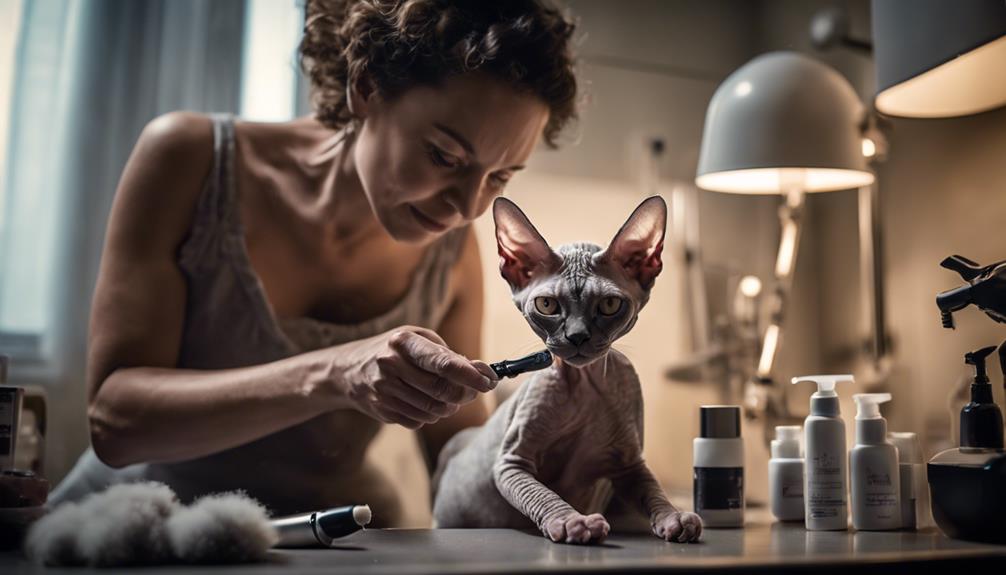So, you think having a Devon Rex cat means saying goodbye to your allergies? Think again. These quirky felines may surprise you when it comes to triggering those pesky reactions.
Before you assume anything, let’s uncover some eye-opening insights that might just change your perspective on Devon Rex cat fur allergies.
Key Takeaways
- Devon Rex cats have unique fur that traps allergens, like the Fel d1 protein.
- Regular grooming can help reduce allergens in the cat’s environment.
- Strategies for managing allergies include creating cat-free zones and using HEPA filters.
- Monitoring health and seeking professional help are crucial for severe allergic reactions.
Common Triggers for Allergies in Devon Rex Cats
Common triggers for allergies in Devon Rex cats include the presence of the Fel d1 protein in their dander and saliva, which can lead to allergic reactions in sensitive individuals. Due to their unique coat texture, Devon Rex cats can trap allergens like Fel d1 more effectively, potentially worsening allergic responses. This is why grooming and cleaning practices are crucial in managing allergens from these cats within the home environment.
Regular grooming not only helps in reducing dander and saliva spread but also aids in controlling the amount of allergens present. Individuals considering owning a Devon Rex cat should spend time around them to gauge their sensitivity to the Fel d1 protein before making a commitment, ensuring a healthier and more comfortable living environment for both the owner and the cat.
Understanding Devon Rex Cat’s Shedding

With their unique coat texture and minimal shedding tendencies, Devon Rex cats present a distinctive aspect in feline grooming and allergen management. The thin and fragile fur of Devon Rex cats makes shedding less noticeable in the home when compared to other breeds. Their short to medium hair, with a soft wavy texture, contributes to this minimal shedding characteristic. Skin conditions in Devon Rex cats may lead to increased shedding and dander production, affecting allergen levels in the environment.
To manage shedding, regular grooming practices such as simple strokes or using a damp cloth are usually sufficient for maintaining the coat of Devon Rex cats. Understanding the shedding patterns of Devon Rex cats can help in reducing allergens in the home and improving the overall well-being of both the cat and its owner.
Factors Influencing Allergic Reactions

Understanding the unique coat texture of Devon Rex cats is crucial in exploring the factors that influence allergic reactions in individuals sensitive to cat allergens. Devon Rex cats produce the Fel d1 protein found in their saliva and dander, which is the primary allergen triggering reactions in susceptible individuals.
Despite their low shedding nature, the unique coat texture of Devon Rex cats may still trap allergens like Fel d1, potentially affecting allergy sufferers. While some consider Devon Rex cats hypoallergenic due to their reduced shedding, allergic reactions to them can vary based on individual sensitivities to the Fel d1 protein present in cat dander.
Managing these allergies requires strategies like using HEPA filters, air purifiers, and minimizing textile surfaces to reduce exposure to allergens.
Managing Allergies With Devon Rex Cats

Managing allergies with Devon Rex cats involves implementing specific strategies to reduce exposure to allergens and minimize allergic reactions in sensitive individuals. When dealing with cat allergies, especially with Devon Rex cats, it’s crucial to take proactive steps to manage the allergens effectively.
Here are three key strategies to help in managing allergies with Devon Rex cats:
- Regular grooming and bathing routines for your Devon Rex cat can help reduce the amount of allergens present on their fur.
- Utilizing HEPA filters in your home can aid in capturing airborne allergens like Fel d1 protein, decreasing the risk of allergic reactions.
- Creating designated cat-free zones within your living space can provide a safe haven for allergic individuals to retreat to when needed.
Tips for Minimizing Cat Allergens

To minimize cat allergens, I recommend the following steps:
Regular grooming sessions for your Devon Rex cat to reduce shedding and dander.
Creating cat-free zones in your home, especially in places like bedrooms, can help limit exposure to allergens.
Using HEPA filters in your home and washing your cat’s bedding frequently in hot water are additional steps to consider for reducing allergen levels.
Allergen-Reducing Cat Grooming
Regular grooming practices for your Devon Rex cat are essential in minimizing cat allergens in your home. To help reduce allergens and keep your cat comfortable, follow these tips:
- Bathe Your Devon Rex Occasionally: Giving your cat a bath can help wash away allergens that may be present on their fur.
- Brush Your Devon Rex’s Coat Gently: Regular brushing can help remove loose fur and dander, reducing the spread of allergens in your home.
- Keep Your Devon Rex’s Living Area Clean: Regularly cleaning your cat’s living area, including their bedding and favorite spots, can help maintain lower allergen levels and create a healthier environment for both your cat and allergy sufferers.
Cat-Free Zones at Home
To create a healthier living environment for both your Devon Rex cat and allergy sufferers, consider designating cat-free zones within your home. These areas, such as bedrooms and furniture where you spend extended periods, can help minimize exposure to cat allergens, reducing allergen buildup and providing relief for those prone to allergies.
Regular cleaning and maintenance of these cat-free zones are crucial to prevent allergen accumulation, improving indoor air quality and decreasing allergy symptoms. By establishing these designated areas, you create spaces that are more comfortable for everyone in your household, including those who may be sensitive to cat allergens.
Consistent upkeep of these zones will contribute to a healthier and more pleasant living environment for all.
Air Purifiers for Allergies
For effective minimization of cat allergens in your home, consider incorporating air purifiers equipped with HEPA filters. Here are three key points to help allergy sufferers reduce cat dander and hair allergens effectively:
- HEPA Filtration: HEPA filters in air purifiers are designed to capture tiny particles, including cat allergens, improving indoor air quality significantly.
- Continuous Use: Regular usage of air purifiers can help maintain low levels of cat allergens in your living space, providing relief to allergy sufferers.
- Complementary Strategies: Combining air purifiers with other allergen-reducing tactics, such as frequent cleaning and grooming of pets, can enhance the overall efficacy of minimizing cat allergens indoors.
The Role of Grooming in Allergy Prevention

Regular grooming of your Devon Rex cat plays a vital role in allergy prevention. By regularly brushing or wiping down your cat’s coat, you can significantly reduce the spread of allergens in your home.
Consistent grooming practices are essential for managing allergies in individuals sensitive to cat allergens.
Grooming Techniques for Allergies
Implementing a consistent grooming routine for your Devon Rex cat is key to reducing allergen levels and preventing allergic reactions. Here are three essential grooming techniques to help manage allergies effectively:
- Regular Brushing: Brushing your Devon Rex cat frequently helps remove loose fur, dander, and saliva, reducing the allergens present on their coat.
- Occasional Bathing: Giving your Devon Rex cat a bath occasionally can help wash away accumulated allergens, further decreasing the risk of triggering allergic reactions.
- Trimming Nails: Keeping your cat’s nails short through regular trimming not only protects you from scratches but also minimizes the transfer of allergens from their paws to their fur.
Frequency of Grooming Sessions
To maintain optimal allergy prevention for your Devon Rex cat, understanding the ideal frequency of grooming sessions is essential. Regular grooming sessions are crucial in reducing the spread of allergens in your cat’s environment. Brushing or combing your Devon Rex cat’s coat helps eliminate loose fur and dander that can trigger allergies in sensitive individuals. It also prevents the accumulation of allergens on their skin and fur.
Bathing sessions can further aid in reducing allergens on the cat’s coat and skin. Consistent grooming routines play a vital role in managing and minimizing allergy symptoms associated with Devon Rex cats. Therefore, scheduling regular grooming sessions is key to keeping allergens at bay and ensuring the well-being of your beloved feline friend.
Benefits of Regular Grooming
In maintaining optimal allergy prevention for your Devon Rex cat, regular grooming plays a crucial role by reducing dander and allergens in their environment. Grooming your cat not only keeps their coat clean but also helps create a healthier living space for allergy sufferers.
Here are three emotional benefits of regular grooming:
- Peace of Mind: Knowing you’re actively reducing allergens can provide comfort and peace of mind.
- Bonding Time: Grooming sessions can strengthen the bond between you and your Devon Rex, enhancing your relationship.
- Healthier Home: A well-groomed cat means a cleaner home, promoting a healthier environment for both you and your beloved pet.
Seeking Help for Severe Allergic Reactions

When experiencing severe allergic reactions to Devon Rex cats, seeking professional help is essential for managing symptoms effectively. Allergic reactions can manifest in various ways, including potentially leading to asthma development over time.
It’s crucial to be aware that symptoms may worsen with prolonged exposure to Devon Rex cats, necessitating medical intervention. Individuals with severe cat allergies should carefully consider the implications before bringing a Devon Rex into their home.
Monitoring for any signs of health issues related to allergic reactions is paramount for responsible ownership. Consulting with a healthcare provider or allergist can provide valuable insights and guidance on how to best address severe allergic reactions to Devon Rex cats, ensuring a safe and healthy environment for both the owner and the cat.




